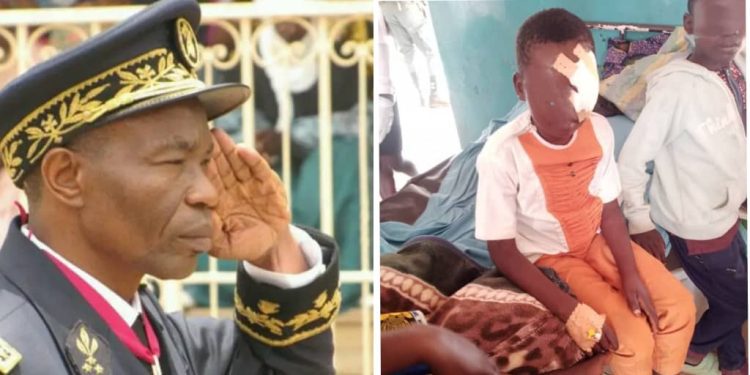Three people have been arrested in connection with the improvised explosion that killed a student and injured over 70 in Nkambe, North West Region of Cameroon, on Sunday, the North West Governor, Adolphe Lele L’Afrique, has said.
Without providing further details on the arrested suspects, Lele L’Afrique blamed Ambazonia separatist fighters for planting the locally made explosive that disrupted National Youth Day celebrations in Nkambe on Sunday, February 11.
“Immediately informed, the SDO (Senior Divisional Officer) mobilised his security services to run after the assailants, the terrorists that put the device, and three of them have already been caught, and they are under very serious investigation,” Mr. Lele L’Afrique told the state broadcaster CRTV.
“The total number of those that were victims of that incident is close to 40, among which four are seriously wounded. Apart from close to 40 wounded, there is one person dead,” he added.
A source in Nkambe who spoke to MMI a few hours after the incident said two people had been confirmed dead. However official figures said only a student was killed.
Our source also painted a picture of the emotional atmosphere at the Nkambe Regional Hospital annex, where most of the victims were receiving treatment.
Many victims underwent amputations, while others suffered serious burns to the face and other parts of their bodies.
No separatist group has yet claimed responsibility for the attack, despite the Governor’s claims that they perpetrated the attack.
The incident was the first significant attack in Nkambe since 2017, when the armed conflict in the English-speaking regions of Cameroon started.
Nkambe has been a haven of peace amid the conflict that has killed more than 6,000 people and displaced over a million others.
Among those who have condemned the attack in Nkambe is the Parliamentarian for Nkambe Central Constituency, Hon. Ngala Gerard Ndombang.
“The population is determined more than ever before to continue with their normal lives. This has just awakened the population of Nkambe to be more vigilant than ever before. We now more determined, and Nkambe will never succumb to threats,” he said.
The MP, who visited the hospital after the incident, has repeatedly prided himself on the peaceful nature of Nkambe, contrasting it with other areas in the North West and South Regions.
‘FRAGILE PEACE’
Unlike other areas in the Anglophone Regions, Nkambe and its surroundings have not been experiencing armed attacks, school boycotts, or lockdowns imposed by separatists.
Prior to the Sunday incident, thousands of people, including schoolchildren, youth leaders, businesspeople, community leaders, and government officials, participated in the Youth Day celebrations at the Nkambe grandstand.
Pictures and videos taken before the explosion showed a lively atmosphere at the event, with children marching agilely and engaging in singing and dancing to commemorate Youth Day.
In most areas of the English-speaking regions, celebrations only took place timidly, with some areas witnessing a total boycott of activities.
This was because separatists had called for a three-day lockdown in the English-speaking regions in the prelude to the event and had issued threats against people participating in the celebration.
For seven years now, the fighters have opposed Youth Day and other official events in the Anglophone Regions, where they are fighting for a breakaway nation called Ambazonia.
However, people who do not abide by the separatist ideology have been defying the calls to participate in national celebrations.
HISTORICAL UNDERTONE
The Youth Day celebration in Cameroon on February 11 is historically tied to the separatist conflict in the Anglophone Regions.
It was on this day, in 1961, that the minority English-speaking British Southern Cameroons voted in a plebiscite to join the majority French-speaking La Republic du Cameroon.
Numerous protests against the English-speaking minority’s marginalization have plagued the union between the two Cameroons over the past 63 years.
One of these protests, which started as a lawyers and teachers’ strike in 2016, was met with a brutal government crackdown that aggravated into an armed conflict a year later, with calls for secession.



